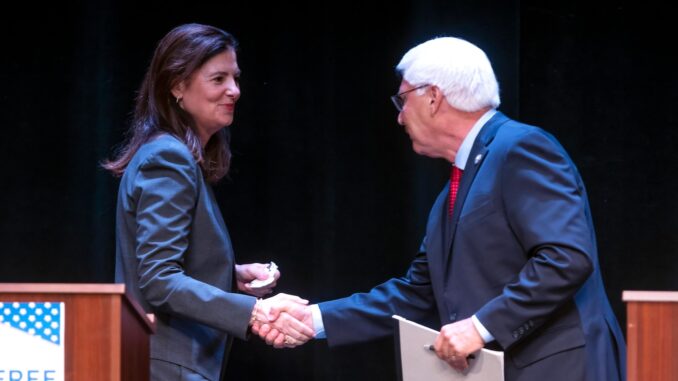
CONCORD, N.H. — New Hampshire primary voters are picking candidates for governor, Congress and the entire state Legislature on Tuesday, setting the stage for short but intense general election campaigns.
In contrast to its first-in-the-nation presidential primary, New Hampshire is among the last states to hold state-level primary elections, leaving the winners just eight weeks to woo voters before Nov. 5.
Two of the top races are extra competitive, with no incumbent running. Republican Gov. Chris Sununu’s decision not to seek a fifth two-year term means the position is open for the first time since 2016. And the 2nd Congressional District, where U.S. Rep. Annie Kuster is retiring after six terms, has not been an open seat since 2010.
Six candidates are competing in the Republican gubernatorial primary, led by former U.S. Sen. Kelly Ayotte and former state Senate president Chuck Morse. The other candidates are Shaun Fife, Robert McClory, Richard McMenamon and Frank Staples.
Ayotte, who was also New Hampshire’s first female attorney general, would be the third woman to be elected governor, following Democrats Jeanne Shaheen and Maggie Hassan. Much of her campaign centered on “Don’t Mass it up,” an anti-Massachusetts slogan, as she focused more on crime and immigration issues and less on traditional anti-tax rhetoric.
Morse, who led the state Senate for a decade, is hoping to return to the Statehouse after losing the Republican primary for U.S. Senate in 2022. He has sought to align himself closely with former President Donald Trump, criticizing Ayotte for rescinding her endorsement of Trump in 2016 before backing him this year.
On the Democratic side, voters are choosing from among three candidates, though the race is largely between former Manchester Mayor Joyce Craig and Cinde Warmington, a member of the Executive Council of New Hampshire. Restaurant owner Jon Kiper lagged far behind in both fundraising and name recognition.
Craig also served on the Manchester school board and board of aldermen before being elected the city’s first female mayor. She says leading the state’s largest city for three terms gives her the experience to be governor, though critics blame her for its ongoing struggles with homelessness and crime.
Warmington, a lawyer, is in her second term on the Executive Council, a five-member panel that approves state contracts and judicial and state agency nominations. As the lone Democrat, she frequently opposes positions taken by fellow members and the governor, particularly on matters related to health care and education. She has been criticized for her past work as a lobbyist for the pharmaceutical industry.
The other high-profile races are in the Democratic-leaning 2nd Congressional District.
In the Democratic primary, Kuster has endorsed former staffer Colin Van Ostern, who is also a former executive councilor who unsuccessfully ran for governor in 2016. He faces strong competition from Maggie Goodlander, who grew up in New Hampshire but has spent most of her adult life in Washington, most recently at the Justice Department and the White House.
The Republican primary includes more than a dozen candidates, led by economist and author Vikram Mansharamani, anti-communist activist Lily Tang Williams and Bill Hamlen, a commodities trader.
In the 1st Congressional District, U.S. Rep. Chris Pappas faces no significant challenge in the Democratic primary as he seeks a fourth term. The GOP contest features seven candidates, including former state Sen. Russell Prescott, Manchester Alderman Joseph Kelly Lavasseur and business executives Hollie Noveletsky, Chris Bright and Walter McFarlane.


Be the first to comment